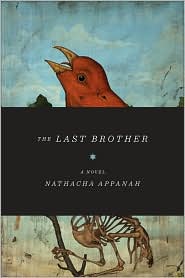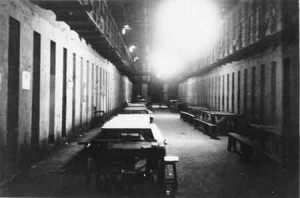“I thought I could banish a little of my mother’s grief by bringing her another son, I believed this kind of thing was possible if one truly loved. I was foolish enough to believe that if for no good reason God took away those whom one loves, He would offer something else, in compensation. And this something else, evidently, was David.”
It is hard to imagine an yone reading this novel and not being moved to tears at least once during the action. Set in Mauritius, where the author grew up, the novel is based on real events that took place during World War II, specifically, the internment of fifteen hundred Jews from Europe who managed to escape their countries as the Nazis took over. When they finally reached Palestine in 1940, however, they were turned away by the British rulers of the Palestinian Mandate because they lacked the required “papers,” then put on a rusty old ship and sent to Mauritius, where they were confined to a camp under British rule, almost the equivalent, to many of them, of a concentration camp, though it lacked the “final solution.” Located in the Indian Ocean, about five hundred miles east of Madagascar, Mauritius became the burial place of three hundred of the men, women, and children who were interned there from 1940 – 1945.
yone reading this novel and not being moved to tears at least once during the action. Set in Mauritius, where the author grew up, the novel is based on real events that took place during World War II, specifically, the internment of fifteen hundred Jews from Europe who managed to escape their countries as the Nazis took over. When they finally reached Palestine in 1940, however, they were turned away by the British rulers of the Palestinian Mandate because they lacked the required “papers,” then put on a rusty old ship and sent to Mauritius, where they were confined to a camp under British rule, almost the equivalent, to many of them, of a concentration camp, though it lacked the “final solution.” Located in the Indian Ocean, about five hundred miles east of Madagascar, Mauritius became the burial place of three hundred of the men, women, and children who were interned there from 1940 – 1945.

The novel is extremely emotional and powerfully moving—beginning as the story of a seventy-year-old man who has returned to Mauritius with his son, specifically to visit the grave of his best friend, David Stein, who, we learn in the first ten pages, died in 1945 at the age of ten. The speaker, Raj, of Indian descent, has never been able to come to terms with the circumstances of David’s death, and has blamed himself for many years for his own part in possibly hastening David’s end. As a child, Raj was shy and lonely, especially after losing both of his brothers in a flash flood, and though he had always been close to his mother, he feared his brutal father, who beat him and his mother. When fate steps in and makes it possible for Raj to come to know a young Jewish orphan, who is interned in the camp where Raj’s father is a warden, he protects this secret relationship, willing to risk all for David, who has become his “last brother.”
Author Nathacha Appanah tells the story in poetic language of great natural beauty and imagery, and her musical cadences give the novel a flow much like that of an opera. Beneath the structure of the plot, Appanah creates a kind of religious identification with nature and its power to affect humans.

The prison in Mauritius where Jews were interned
Raj’s mother is an animist, believing in nature’s power to bring about cures through plants, and to even control human life. She regards the red bird who perches on David’s head when Raj introduces her to him as a natural, benevolent sign from her God. Raj, however, has also been exposed to the idea of Christmas by the woman for whom his mother does sewing, who has told him about Jesus, and he is intrigued by a savior who loved everyone and wept with the poor, and [had even] performed miracles and walked on water.” He is not sure why this God allowed his brothers to perish in the raging waters of a stream near their house. And his friend David exposes him to the ideas of Judaism and the Star of David, though Raj does not know what all this means. He regards the “star” as a natural phenomenon.
None of these religious beliefs, however, are able to protect Raj from his father’s brutal beatings. After one particularly horrific beating, suffered when he tries to protect his mother, he is admitted to the hospital at the internment camp where his father works. Suffering from many cracked and broken bones, he remains there for several days, enjoying his “visits” from David, whom he had met only briefly before that, some visits occurring when he is only semi-conscious.

Jewish Cemetery, Mauritius, 1940 – 1945
“I was convinced,” Raj says, “that he recognized me as soon as he saw me, identified me physically, but also recognized my unhappiness and I felt very calm, as if I were in one of my hiding places, and here no one could take my brothers away from me or do me harm.” Since David is from Prague, they communicate as well as they can in French, but since neither of them knows French very well, they communicate best through their love of games, something that Raj has missed since the deaths of his brothers.
Appanah goes beyond the typical “coming of age” novel to depict a world of dramatic contrasts—the horrors of a cyclone contrasting with the beauties of the red bird suddenly perching on David’s head, and the brutality of Raj’s father contrasting with the loving kindness of his mother and the willingness of the two boys to sacrifice for each other. The whole concept of love is explored as a uniquely human characteristic, even when it is sometimes confused with “need,” and the mysteries of the larger world and one’s place in it sometimes remain mysteries, no matter how much one might wish them to be otherwise.
Sensual, emotional, and somet imes reminiscent of Nobel Prize winner J. M. G. Le Clezio’s The Prospector, which is also set in Mauritius, this novel is similar in tone and in its use of romantic images and events to propel the action. Both novels contain elements of melodrama, with the worst of all possible outcomes occurring again and again, despite the hopes and dreams of their protagonists. It is in the vibrant characters, with whom readers will identify, that both of these novels escape the negative connotations of most melodramas, and in the case of this novel, in particular, it is difficult to imagine any reader not being moved to tears by many of the events which take place.
imes reminiscent of Nobel Prize winner J. M. G. Le Clezio’s The Prospector, which is also set in Mauritius, this novel is similar in tone and in its use of romantic images and events to propel the action. Both novels contain elements of melodrama, with the worst of all possible outcomes occurring again and again, despite the hopes and dreams of their protagonists. It is in the vibrant characters, with whom readers will identify, that both of these novels escape the negative connotations of most melodramas, and in the case of this novel, in particular, it is difficult to imagine any reader not being moved to tears by many of the events which take place.
Photos, in order: The author’s photo is from http://www.dieselbookstore.com
The photo of the prison camp at Beau-Bassin (in the center of Mauritius) comes from the remarkable website of Heinrich Wellisch, who tells of the problems he and his family faced as they fled Nazi-occupied Austria in an old, overcrowded ship, only to be refused entry to British occupied Palestine, and shipped to Mauritius. In 1945, Heinrich Wellisch joined the Jewish brigade as part of the British army, serving until 1949. He and his family now live in Canada. http://www.jewishtraces.org
The Jewish Cemetery at St. Martin, 1940 – 1945 (on the southern tip of the island), is shown on http://www.maidenheadsynagogue.org.uk
The photo of Mauritius is from http://www.mauritiusottawa.org
